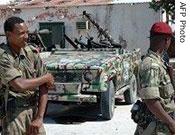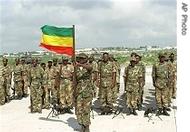Photo: Ethiopian soldier in Mogadishu (BBC)
Boomberg
By Jason McLure
Jan. 5 (Bloomberg) — Ethiopia declared its two-year occupation of Somalia a success as its forces began the last stage of withdrawal, leaving behind one of the world’s worst humanitarian crises and a government close to collapse.
“Mission accomplished,” the Foreign Ministry said in an e-mailed statement today in the Ethiopian capital, Addis Ababa. “Our defense forces have carried out a successful mission to eliminate the clear and present danger that our country had faced two years ago.”
U.S.-backed Ethiopian soldiers invaded Somalia in December 2006, ousting the Islamic Courts Union, an Islamist alliance that had briefly controlled much of the country. Its attempt to reinstall the United Nations-backed transitional government in the capital, Mogadishu, was met with an Iraq-style insurgency by Islamist and clan-based militias.
More than 800,000 have been forced from their homes by the fighting, while an estimated 3.2 million people, more than 40 percent of the country’s population, are in need of humanitarian aid. The seas off Somalia have become the world’s most dangerous for commercial shippers as the anarchy has led to rapid growth of piracy and kidnappings.
As a result of the insurgency, the transitional government controls only parts of Mogadishu and the southern town of Baidoa, while Islamists from the al-Shabaab militia, a faction of the Islamic Courts Union, control much of southern Somalia. On Dec. 29, the president of the transitional government, Abdullahi Yusuf Ahmed, resigned following a power struggle with Prime Minister Nur Hassan Hussein. Read More.
———————————-
Ethiopia Leaves Somalia With Many Questions Unanswered
VOA
By Joe DeCapua
Washington D.C
05 January 2009

Ethiopian soldiers in
Mogadishu, (file photo)
As Ethiopian troops withdraw from Somalia, the Ethiopian government has released a statement saying its mission in Somalia has been accomplished. It says Ethiopian forces, during their two year occupation, have eliminated a clear and present danger. However, Ethiopia leaves behind a country in turmoil and one of the world’s worst humanitarian crises.George Washington University Professor David Shinn, a former US ambassador to Ethiopia, spoke to VOA English to Africa Service reporter Joe De Capua about whether Ethiopia can declare “mission accomplished.”
Read more at VOA.
————————————-
Four Ethiopian Soldiers Killed in Somalia
By VOA News
04 January 2009
Witnesses in Somalia say at least four Ethiopian soldiers were killed by a roadside bomb near Mogadishu.
The blast took place Saturday on a road west of the capital where troops were searching for explosive devices.
Several other soldiers were injured in the blast.
Ethiopia said Saturday that the withdrawal of its troops from Somalia will be completed “within days.”
A foreign ministry statement said military commanders are handing over their responsibilities to African Union peacekeepers and Somali transitional government troops.
A ministry spokesman, Wahde Belay told VOA that sufficient precautions have been made to prevent a power vacuum in Somalia after Ethiopian troops are gone.
About 3,200 soldiers from Burundi and Uganda make up the AU mission in the country. Burundi’s Defense Minister, General Germain Niyoyankana. said Sunday the two countries would consider withdrawing their forces unless more troops and supplies are sent to the country.
Islamist insurgents have taken control over many towns in recent weeks and moved to impose strict forms of sharia (Islamic) law.
Ethiopia sent troops to Somalia in late 2006 to help the government oust Islamists who had taken over Mogadishu and much of the country. The offensive was successful but sparked a bloody insurgency that has killed thousands of Somalis and displaced more than a million others.
Some information for this report was provided by AF and Reuters.
—————
Ethiopia to Complete Somalia Withdrawal ‘Within Days’

Ethiopian troops in Mogadishu.
(file photo)
VOA
By Peter Heinlein
Addis Ababa
03 January 2009
A spokesman says Ethiopian troops will complete their withdrawal from Somalia “within days,” and that sufficient precautions have been made to prevent a feared power vacuum when they are gone. Troop convoys have been seen pulling back to positions across the border in Ethiopia’s Somali region.
Ethiopia’s Foreign Ministry issued a statement saying military commanders have completed handing over their responsibilities in Somalia to African Union peacekeepers and soldiers of the country’s transitional government. Ministry spokesman Wahde Belay told VOA in a telephone interview all precautions have been taken to provide security for the AMISOM and TFG forces.
“We believe there will not be a vacuum. That is why we consulted with those forces, the AMISOM and TFG forces,” he said. “We made sure that we have not left a vacuum there. They are ready to take their responsibility in assuring calm in Somalia. This is all I can say for now.”
Wahde declined to elaborate on what measures have been taken, but the press statement noted that both Uganda and Burundi, the two troop contributors to AMISOM, had confirmed their willingness to boost the size of their forces. AMISOM currently has a strength of about 3,400 troops but they are ill-equipped and under-funded and have been unable to restore much stability in Somalia.
The TFG is also believed to have several thousand soldiers.
African Union officials are known to be actively trying to solicit more troops contributions.
Spokesman Wahde confirms that the Ethiopian withdrawal is well under way, and should be completed soon.
“We have specifically said it will take a few days in order to complete the withdrawal. I don’t want to comment on what will happen next,” he said.
Ethiopia had earlier said it would provide security for the AMISOM forces if they decided to join the pullout, but African Union officials have indicated they will continue their peacekeeping mission. African Union Commission Chairman Jean Ping last month told reporters, “a withdrawal from Somalia is something we cannot accept, not only the AU but also the rest of the world.”
Several western diplomats, who declined to be identified because they are not authorized to speak publicly, have expressed fear of a bloodbath unless the peacekeeping forces are substantially reinforced to replace the several thousand departing Ethiopian soldiers.
Reports from Somalia over the past few days have spoken of clashes between rival Islamist factions vying for control as Ethiopian convoys head back across the border. Both western and African analysts have voiced concern that extremist forces might overrun the AMISOM and TFG troops and capture the capital, Mogadishu.
Ethiopia sent troops to Somalia in December, 2006 to drive out an Islamic Courts Union that had imposed Sharia law over parts of the country. The Ethiopians installed a U.N.-backed but feeble transitional government, but were not able to provide stability in the lawless country that has been without an effective administration since 1991.
——————–
Somali police stations taken over

Ethiopian forces are leaving after two
years in Somalia
BBC
Sunday, 4 January 2009
Islamist militiamen have taken over a number of abandoned police stations in the Somali capital as Ethiopian troops continue to withdraw from the city.
The militiamen said they were moving in to prevent an explosion of violence.
They are thought to support a faction that has signed a peace deal with Somalia’s transitional government.
A more militant group, al-Shabab, is continuing the insurgency. Ethiopia has said it aims to ensure there is no security vacuum after it withdraws.
Separately, at least six people are reported to have died in fighting between rival Islamic factions further north.
Members of al-Shabab clashed with local supporters of a rival group – Ahlu Sunna Wal-jamaah – in Guriel, about 400km (250 miles) north of Mogadishu.
Ethiopian military forces began pulling out of Somalia on Friday after two years helping the transitional government fight insurgents.
Ethiopian Prime Minister Meles Zenawi’s spokesman said the withdrawal would take several days.
About 3,400 Ugandan and Burundian peacekeepers from the African Union in Somalia are taking up positions vacated by the Ethiopians.
There are fears the withdrawal of the 3,000-strong Ethiopian force could lead to a power vacuum and that violence will continue despite a peace deal between Somalia’s transitional government and one of the main opposition factions.
However others say the pullout, together with the resignation of President Abdullahi Yusuf, could make it easier for a new government to be formed.
——————-
Ethiopian Army Begins Leaving Mogadishu
NYT
By MOHAMED IBRAHIM and JEFFREY GETTLEMAN
Published: January 2, 2009
MOGADISHU, Somalia — Ethiopian Army trucks, packed with soldiers, tents, mattresses and other gear, began to pull out of Mogadishu, Somalia’s battle-zone of a capital, on Friday in the first signs of the expected Ethiopian withdrawal.
Many Somalis in their path immediately fled, predicting that the departing Ethiopian troops would be attacked by mines and insurgents. Almost as soon as they began to move, the Ethiopians hit a roadside bomb. At lease nine civilians were killed, and an unknown number of Ethiopian soldiers.
Thousands of Ethiopian troops stormed into Mogadishu two years ago in an attempt to shore up Somalia’s weak transitional government and to wipe out an Islamist administration that the Ethiopians considered a terrorist threat.
But the Ethiopian occupation mostly failed. The Somali government is as divided and weak as ever. Islamist insurgents, many of them quite radical and violent, have seized control of much of Somalia. Thousands of civilians have been killed in relentless combat between Islamist militants and the Ethiopians, with European Union officials accusing the Ethiopians of war crimes. And millions of Somalis are now on the brink of famine, the victims of war, displacement, drought and disease.
The Ethiopians were never popular in Somalia. But as people in Mogadishu watched the first convoy of 18 heavily loaded trucks chug down the bullet-pocked streets and head toward the Ethiopian border on Friday, many said they feared what would happen next.
“If the Ethiopians leave, there is a possibility of war among the Islamist fighters,” said Jamal Ali, a student at Mogadishu University.
It is not clear whether the Ethiopian troops are leaving Somalia entirely or simply redeploying from Mogadishu to other areas of the country. Western diplomats estimate there are still several thousand Ethiopian troops inside Somalia, and many Somalia analysts have predicted that the Ethiopians will linger for some time inside the country or along the border as a buffer against Islamist militants.
“We have already started to implement our withdrawal plan, “ said Bereket Simon, a high-ranking Ethiopian official, according to Agence France-Presse. “It is a process and it will take some time.”
Around 3,000 African Union peacekeepers are still in Somalia, trying to protect the few fortified enclaves that Somalia’s transitional government controls. On Thursday, a little-known Islamist group called the Ras Kamboni Rebels attacked peacekeepers in two locations, though it was not clear how many people, if any, were killed.
Mohamed Ibrahim reported from Mogadishu, Somalia, and Jeffrey Gettleman from Nairobi, Kenya.
